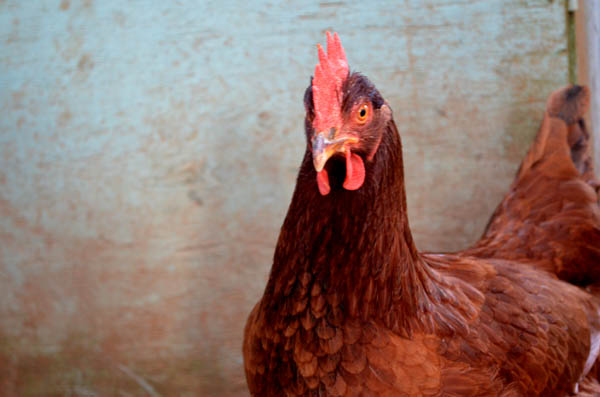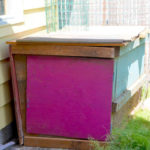Last fall our six-year old hen Maude passed away. It happened quickly – she lost weight and became lethargic in just a couple weeks. We tried nursing her back to health, but she passed away just a couple nights later. Chickens can live to be 7-10 years old, so we thought Maude’s passing was a bit premature.
Florence, our Rhode Island Red, is the same age as Maude. She became lame on one leg seemingly overnight. Hoping it was just a sprain, we separated her from the flock to prevent bullying to let it heal. After a couple weeks, she started pecking her leg raw – clearly it was time to intervene.

Florence trying to peck off her foot after it went lame.
When you have a trouble hen, you’re left with two options – butcher or treat. Old hens don’t taste very good and I was worried about whether there might be a bigger underlying illness, especially with Maude’s recent passing. We opted to treat her.
First, we cleaned the wound by soaking it in espom salts. Unfortunately this all happened during a snow storm, so clean gauze and painter’s tape was all we had to protect her foot from her own pecking.

Soaking Florence’s foot in epsom salts to clean it and help with swelling
Then, we called the vet. $85 dollars later, we have some answers.
Florence has an infection in her foot. Apparently there’s not much room for swelling in a chicken foot, so it becomes very painful quickly which is why she suddenly stopped using the leg.

Our chop-shop bandage job of gauze and painter’s tape
It could have started a number of ways. Chickens live in dirty environments, despite our best efforts to keep their coops clean. She could have been scratched by another hen, then the small scrape got infected. Or it could be something even more difficult to prevent, like an arthritic inflamed joint becoming infected – something younger, more robust chickens can fight off, but something an older hen like Florence couldn’t beat.
The solution from the vet is an oral antibiotic that we are administering twice a day for two weeks. If we don’t see improvement, the vet said she may just be too old to bounce back. At that point, we’ll likely butcher and bury her.

Florence visits the vet
It’s a challenge managing aging members of the backyard flock. The ideal situation is to probably raise new chickens every 1-2 years and butcher the hens older than 3-4 years. As they get older, they become more vulnerable to disease and injury. The vet confided they rarely see hens over three years old in their practice.
We don’t see our chickens as “pets” in the same way we see our indoor cats and dogs as pets. But there is still some sentimentality there. Our nine year old hen Pearl has been with us since our homestead was just sprouting. And Florence was on the inside cover of my book!

Florence gracing the inside cover of my book Modern Homestead (photo credit: the wonderfully talented Isaac Viel)
It will be a sad day when we have to say goodbye to our older hens. In this case, the price was worth paying to know her problem was unavoidable and it’s not contagious. I’ll keep you posted as I think the world needs a bit more information out there on caring for older hens!






Florence is very photogenic, I can see why you picked her for your book! I’m curious: when you say if there’s no improvement you’ll likely “butcher and bury” her, is butcher the correct term for killing a chicken? I’m assuming an elderly chicken wouldn’t be fit to eat, but please correct me if I’m wrong. I love reading about your chickens 🙂
Emily, you are right that “butcher” is probably not the right term as we are not planning to eat her. Old birds are not super tasty, but normally we would still probably eat her if it wasn’t for her infection. You shouldn’t consume an animal that has an infection and/or is being treated with antibiotics.